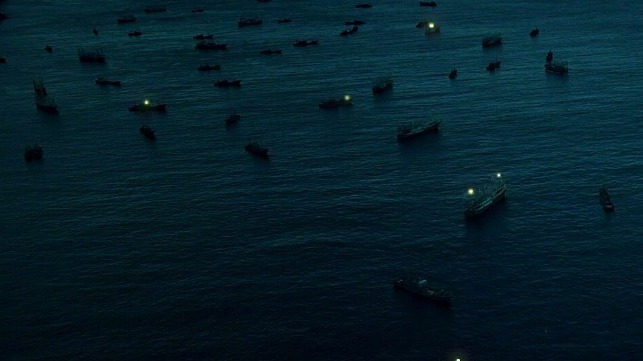The Outlaw Ocean Episode 2: The World's Largest Illegal Fishing Fleet

If you look at the taxonomy of crime that plays out offshore, it's both diverse and acute. And yet illegal fishing sits at the top of that hierarchy. A global business estimated at $10 billion in annual sales, and one that is thriving as improved technology has enabled fishing vessels to plunder the oceans with greater efficiency.
The Thunder thrived in this context. Interpol had issued a Purple Notice on the ship, the equivalent of adding it to a Most Wanted List, a status reserved for only four other ships in the world. The vessel had collected over $76 million from illicit sales in the past decade, more than any other ship, according to agency estimates.
Banned since 2006 from fishing in the Antarctic, the Thunder had been spotted there repeatedly in recent years. In 2015, there’s where the environmental organization Sea Shepherd found them. Speaking through a translator, Peter Hammarstedt, captain of the Bob Barker, warned that the Thunder was banned from fishing in those waters and would be stopped.
It was the beginning of an extraordinary chase and the subject of the second episode of The Outlaw Ocean podcast, from CBC Podcasts and the L.A. Times. Listen to it here:
For 110 days and more than 10,000 nautical miles across two seas and three oceans, the Bob Barker and a companion ship, both operated by Sea Shepherd, trailed the trawler, with the three captains close enough to watch one another’s cigarette breaks and on-deck workout routines. In an epic game of cat-and-mouse, the ships maneuvered through an obstacle course of giant ice floes, endured a cyclone-like storm, faced clashes between opposing crews and nearly collided in what became the longest pursuit of an illegal fishing vessel in history.
As chronicled by The Outlaw Ocean Project, a non-profit journalism organization, whose reporter was on board the Bob Barker, the chase ended with a distress call from the Thunder. “We’re sinking,” the Thunder’s captain pleaded over the radio. The ships operated by Sea Shepherd rescued the crew and tried gathering evidence of its crimes before the ship sank to the bottom of the ocean.
They took them to the nearest port officials in São Tomé and Príncipe, where the Thunder’s senior crew members were arrested. Three officers were charged with a variety of counts, including pollution, negligence and forgery. But losing the ship—and the evidence that went down with it, including the fish in the hold, onboard computers, various records and fishing equipment—makes prosecution more difficult, Interpol and Sea Shepherd officials acknowledged.
The second episode of The Outlaw Ocean podcast also discussed another notorious case related to illegal fishing that happened on the seas off the coast of North Korea.
The battered wooden “ghost boats” drift through the Sea of Japan for months, their only cargo the corpses of starved North Korean fishermen whose bodies have been reduced to skeletons.
For years the grisly phenomenon mystified Japanese police, whose best guess was that climate change pushed the squid population farther from North Korea, driving the country’s desperate fishermen dangerous distances from shore, where they become stranded and die from exposure.
But an investigation conducted by The Outlaw Ocean Project, based on satellite data, revealed what marine researchers now say is a more likely explanation: China is sending a previously invisible armada of industrial boats to illegally fish in North Korean waters, violently displacing smaller North Korean boats and spearheading a decline in once-abundant squid stocks of more than 70 percent.
The Chinese vessels—nearly 800 in 2019— were in violation of U.N. sanctions that forbid foreign fishing in North Korean waters. The sanctions, imposed in 2017 in response to the country’s nuclear tests, were intended to punish North Korea by not allowing it to sell fishing rights in its waters in exchange for valuable foreign currency.
The episode explores what experts have called the largest known case of illegal fishing perpetrated by a single industrial fleet operating in another nation’s water.
Ian Urbina is the director of The Outlaw Ocean Project, a non-profit journalism organization based in Washington DC that focuses on environmental and human rights concerns at sea globally.
The opinions expressed herein are the author's and not necessarily those of The Maritime Executive.
